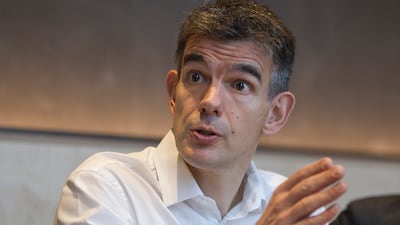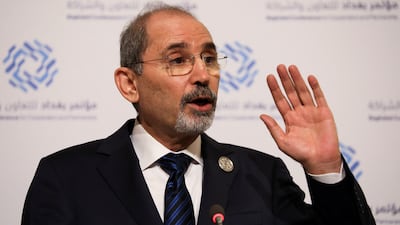One of the biggest talking points at the World Economic Forum Annual Meeting this year is the influence of technology, and particularly AI, across all sectors and its continued exponential growth.
Technology companies are out in full force in Davos, among them Google, with executives speaking in public sessions and holding meetings with leaders from the public and private sectors.
Matt Brittin, president for Google EMEA, is among those concerned about the year ahead.
“Going into 2023, the world faces some big challenges, whether it's energy security, the cost of living crisis, the climate crisis, also harnessing technology for good,” he said.
In an exclusive interview with The National, he said that to tackle those issues “it is very clear that governments, companies and communities working together is essential, and technology can help in each of these challenges”.
Mr Brittin said that in times of difficulty, the forum becomes even more important “because it has that ability to bring those leaders together from NGOs, companies and governments to really look at how we can work together on some of these challenges”.
As their role and influence grows, tech companies are under increasing scrutiny.
World Economic Forum in Davos — in pictures
Mr Brittin said more could be done, particularly in terms of safety and protection online.
“There is a huge opportunity to harness technology for good, but also to understand the responsibilities of technology and technology companies and how the new rules of the road need to work,” he said.
The challenge is to “get the benefits of technology but protect against its misuse … it needs rules of the road”.
As 2022 drew to a close, there was much interest in ChatGPT, which has been developed by OpenAI but builds on technology developed by several companies, including Google. The way it presents information has increased interest in the power of AI.
Business Extra podcast in Davos: Mubadala's Badr Al Olama on UAE's competitiveness
“AI is making really substantive advances and we see more and more practical uses where AI can make a difference, whether that's from the DeepMind work on Alphafold [responsible for] protein folding, making 200 million protein structures available for biologists all around the world to accelerate drug discovery and research,” Mr Brittin said.
Google was among the first companies to work on the parameters needed to handle AI and published a list of “principles” about its use of AI.
They include guidelines on the use of datasets, bias and collaboration. DeepMind, a company bought by Google in 2014, publishes papers and models and makes libraries available.
“We've encouraged an open discussion with policymakers around how do we harness this for good? How do we help people understand what's quite a technical capability … we haven't necessarily done a brilliant job of explaining that in human terms,” Mr Brittin said.
Business Extra podcast in Davos: CEO of Tech Mahindra on the ‘good’ recession
He is concerned about the geopolitical ramifications of the current era on technology. “We are seeing fragmentation of the globalisation system that we kind of took for granted. And frankly, it's a western-led globalised system that everybody's benefited from … but we're entering different political terrain,” he said.
One of the issues Google is concerned with is maintaining an open internet, but it is beginning to consider how to plan if there is a “decoupling”.
While Mr Brittin did not speak about China specifically, “decoupling” usually refers to China and the West. “Resilience, cybersecurity, these are issues where actually international infrastructure and capability is important. So I think getting the balance right in these things is vital,” he said.
He said “we’ve got this sort of breakdown of geopolitical alignment, and we need to be really thoughtful about that in the context of actors like Russia and China with different systems”. But there are also issues among close western allies. Mr Brittin said one of the biggest challenges has been “the lack of a transatlantic agreement and data flows”, despite the US and EU saying they will work through the issues.
As for online safety, all of Google’s platforms, but particularly YouTube, are heavily invested in clamping down on harmful content, while respecting freedom of expression.
Mr Brittin said “this is always a set of moving targets” and that, as technology develops, policies and measures need to be updated.
“Who would have thought we needed a policy around ‘does 5G technology cause Covid?’ but we did,” he quipped while explaining the need for measures to tackle misinformation during the pandemic.
Preparations for World Economic Forum in Davos — in pictures
Google uses a mix of AI and human judgment to carry out content moderation. But he said users also had to be careful.
“People have to recognise that the internet and the real world are similar. You wouldn't put your daughter out on the streets and let her navigate the world. And the same thing I think applies to the internet.
“It's like the real world - there are places where you need to be and there are places where you where you might not want to go.”
But on the whole, Mr Brittin is optimistic about the future. With more than 60 per cent of the world’s population online, the opportunities are abundant.
“Anybody who creates content, anybody who sells things, anybody who is in entertainment can reach a global audience,” he said. The potential of that reach represents “a huge opportunity to really help people think differently about economic opportunity”.
“When I was a kid, only the world's biggest companies could do international stuff. Now, anybody with a smartphone and an idea can do that,” he said.
As for the economic downturn, there will be opportunities for small businesses, but there will also be a need for workforces to learn new skills.
“A lot of the training we do on digital skills, and a lot of our products are designed to help on that,” Mr Brittin said.
Curtain-raiser for World Economic Forum in Davos - in pictures
This comes after the pandemic contributed to change in the nature of work. As for Google’s own work practices, Mr Brittin said “there's a huge opportunity for more flexible working”, but there are also concerns about how new work practices affect different groups.
“We're all learning. Data from the pandemic suggests that women's participation in the economies has fallen, people have reduced hours, or stopped working — that's a real problem if you want companies that are run by everyone.”
Clarity in how work and organisations progress will be vital.
“You don’t want to be in a situation where a manager can decide from day to day, who needs to be [where] and when you actually need to get to plan your lives and make sure that it's more flexible.”
Inclusion and structure will be crucial. “At Google, our mission is to organise the world's information and make it useful and accessible for everyone,” he said.
“We've got a big obligation as a tech company, if we're going to have products that work for everyone for them to be built by everyone.”
Google’s plans include hiring more engineers across Europe, the Middle East and Africa, in addition to having engineers from different social and cultural backgrounds.































































































































